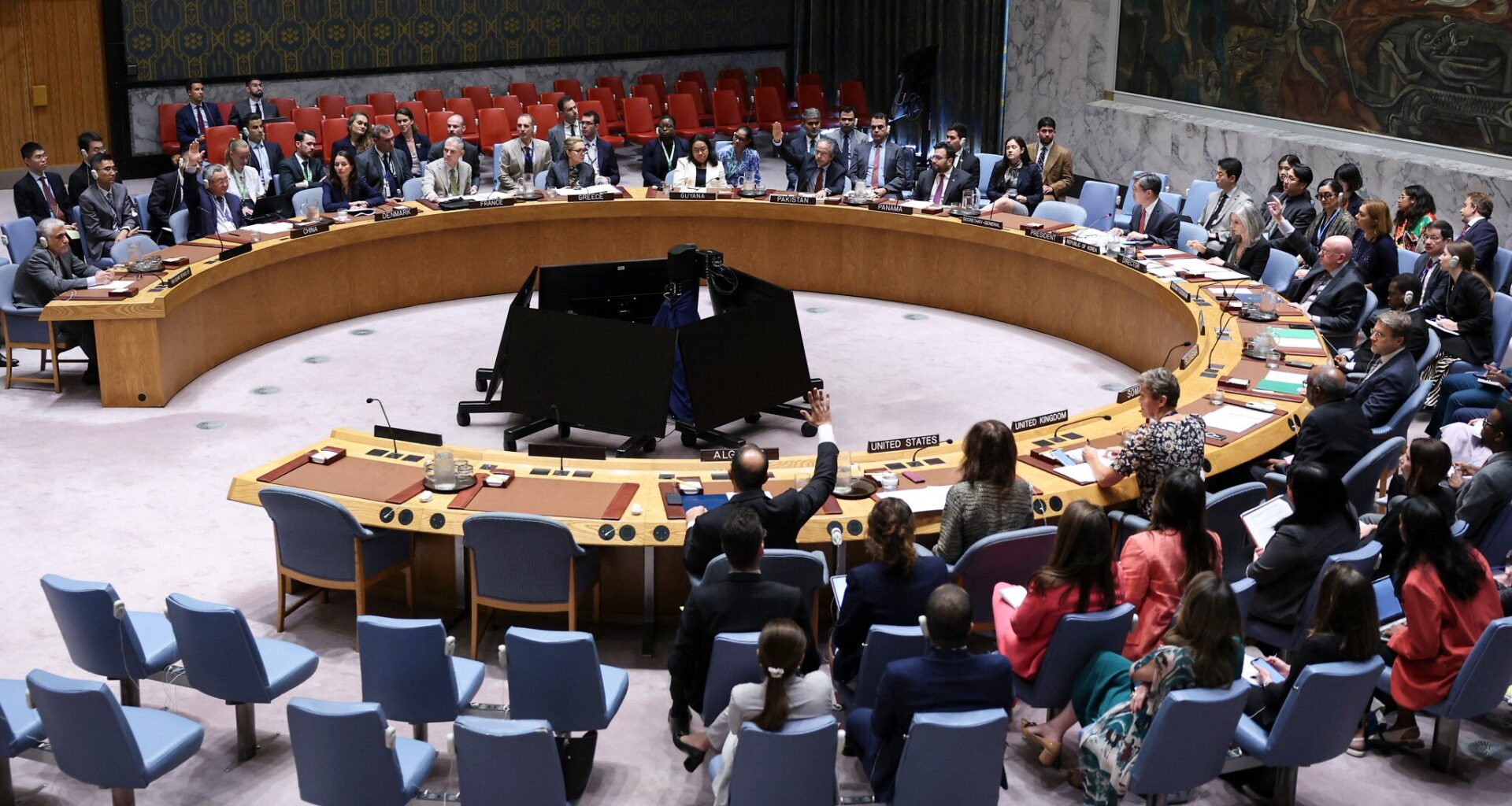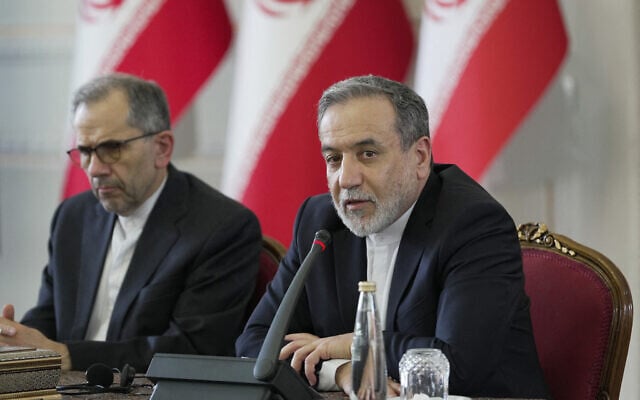The United Nations Security Council on Friday voted against a resolution that sought to block the reimposition of deep economic sanctions on Tehran over its resurgent nuclear program.
The vote prompted anger from Iran, which condemned France, Britain and Germany for an “illegal, unjustified and provocative” effort to reimpose “snapback” sanctions on the Islamic Republic under a 2015 nuclear deal, but indicated a diplomatic solution could still be reached.
Triggering the “snapback” mechanism required the Security Council to vote on removing the sanctions from Iran. The draft resolution was put forward by South Korea, the current president of the 15-member council, but did not garner the support of the nine countries required to halt the sanctions from taking effect at the end of the month.
Iran’s ally Russia, which is also signatory to the 2015 deal, voted in favor of the draft resolution to permanently lift sanctions from Iran, as did China, Pakistan and Algeria. Nine members, including France and Britain, voted against the resolution, while two abstained.
France, Britain and Germany, collectively known as the E3 nations, are signatories to a 2015 deal with Tehran that eased some sanctions in exchange for restrictions on Iran’s nuclear activity.
Get The Times of Israel’s Daily Edition
by email and never miss our top stories
By signing up, you agree to the terms
Accusing Iran of failing to abide by the agreement, the E3 triggered the “snapback” mechanism on August 28 following unsuccessful talks with Iran to reach a new nuclear agreement.
The mechanism launched a 30-day period for the return of all the UN sanctions that were in place on Iran before the 2015 deal, including a conventional arms embargo, restrictions on ballistic missile development, asset freezes, travel bans and a ban on producing nuclear-related technology.
The Security Council vote Friday has now set up eight days of intense diplomacy while world leaders, including Iran’s President Masoud Pezeshkian, are in New York for the annual UN General Assembly.
Iranian Foreign Minister Abbas Araghchi is set to meet with his European counterparts on the sideline of the high-level gathering, Iranian UN Ambassador Amir Saeid Iravani told reporters after the UN Security Council vote Friday, adding that the door to diplomacy over Iran’s nuclear program was still open.
Earlier Friday, Araghchi said he had put forward a “fair and balanced” proposal to European powers to prevent the return of sanctions.
He said in a telephone call with the UN nuclear watchdog chief after the Security Council vote that Iran was subject to “unfair pressure” and “rejects any political action and unfair pressure that could lead to an escalation of tensions.”
Iranian Foreign Minister Abbas Araghchi (R) meets with ambassadors and diplomatic representatives in Tehran, Iran, on July 12, 2025. (Hamid FOROUTAN / Iran’s Ministry of Foreign Affairs / AFP)
In her remarks at the Security Council, British UN Ambassador Barbara Woodward also said “the United Kingdom remains committed to a diplomatic solution.”
“We are ready for further engagements diplomatically in the next week and beyond to seek to resolve differences,” she said.
French envoy Jérôme Bonnafont also said the option of a negotiated settlement was still on the table, despite French President Emmanuel Macron telling Israel’s Channel 12 in an interview broadcast Thursday that he expected the sanctions to be reinstated by the end of the month.
Meanwhile, Israel’s Foreign Minister Gideon Sa’ar said after the Security Council vote that “the international community’s goal must remain unchanged: to prevent Iran from ever acquiring nuclear capabilities.”
The statement on X avoided explicitly welcoming the Security Council vote.
Today, the UN Security Council voted to reinstate extensive sanctions on Iran, effective September 28.
Iran’s nuclear program is not intended for peaceful purposes.
A nuclear-armed Iran would mean that the most dangerous regime possesses the most dangerous weapon, dramatically…
— Gideon Sa’ar | גדעון סער (@gidonsaar) September 19, 2025
Israel has demanded that Iran cease all uranium enrichment. Though Iran, whose leaders are sworn to Israel’s destruction, publicly denies seeking nuclear weapons, it has enriched uranium to a level far beyond what is needed for civilian usage, and a short step away from weapons-grade.
Israel said Iran was taking steps toward imminent weaponization before Israel struck Iran’s nuclear facilities, missile production and top military leadership on June 13, leading to a 12-day war that ended with a US-brokered truce.
The war put an end to nuclear negotiations that had been going on for some two months between Iran and the US, which was also a signatory to the 2015 deal before leaving it in 2018, during US President Donald Trump’s first term.
During the Israel-Iran war, the US struck three key Iranian nuclear sites, which Trump has said were “obliterated” despite leaked intelligence assessments to the contrary.
Is The Times of Israel important to you?
If so, we have a request.
Every day, even during war, our journalists keep you abreast of the most important developments that merit your attention. Millions of people rely on ToI for fast, fair and free coverage of Israel and the Jewish world.
We care about Israel – and we know you do too. So today, we have an ask: show your appreciation for our work by joining The Times of Israel Community, an exclusive group for readers like you who appreciate and financially support our work.
Already a member? Sign in to stop seeing this
You appreciate our journalism

You clearly find our careful reporting valuable, in a time when facts are often distorted and news coverage often lacks context.
Your support is essential to continue our work. We want to continue delivering the professional journalism you value, even as the demands on our newsroom have grown dramatically since October 7.
So today, please consider joining our reader support group, The Times of Israel Community. For as little as $6 a month you’ll become our partners while enjoying The Times of Israel AD-FREE, as well as accessing exclusive content available only to Times of Israel Community members.
Thank you,
David Horovitz, Founding Editor of The Times of Israel


